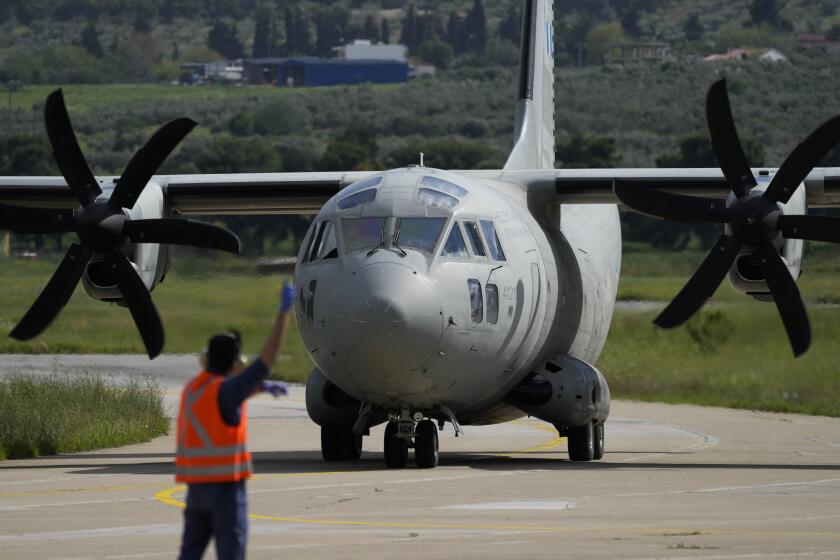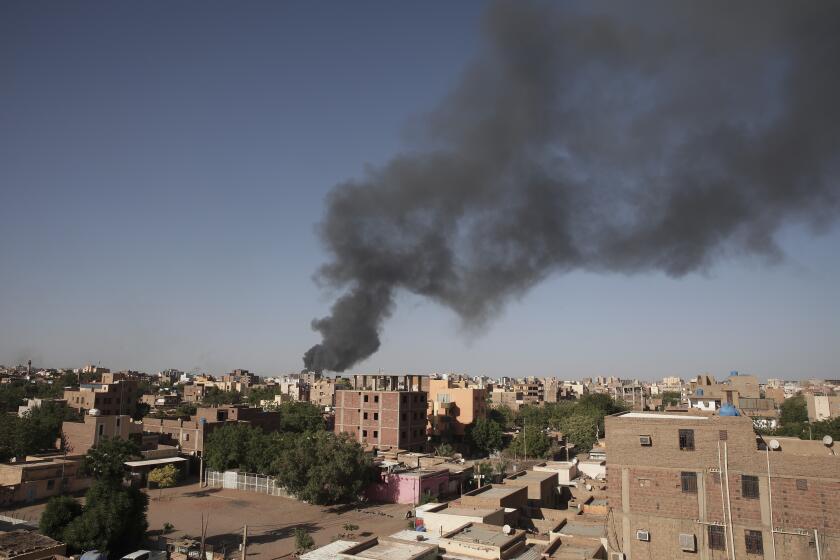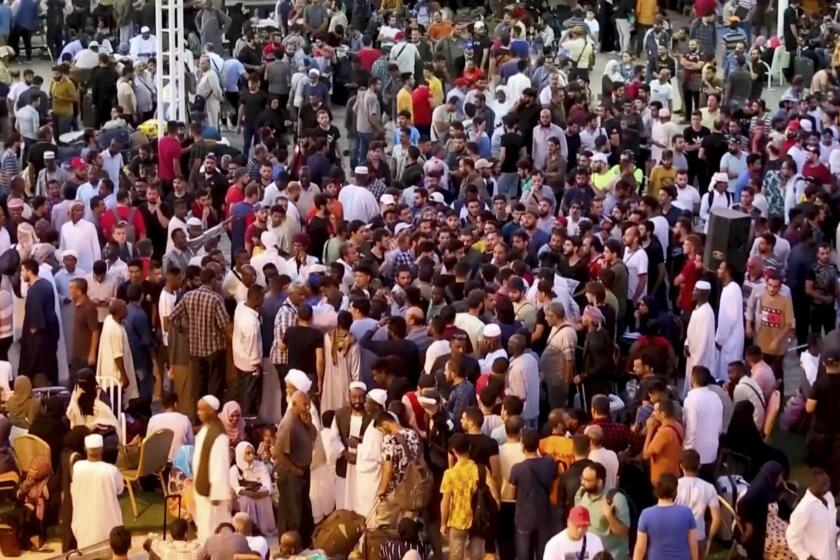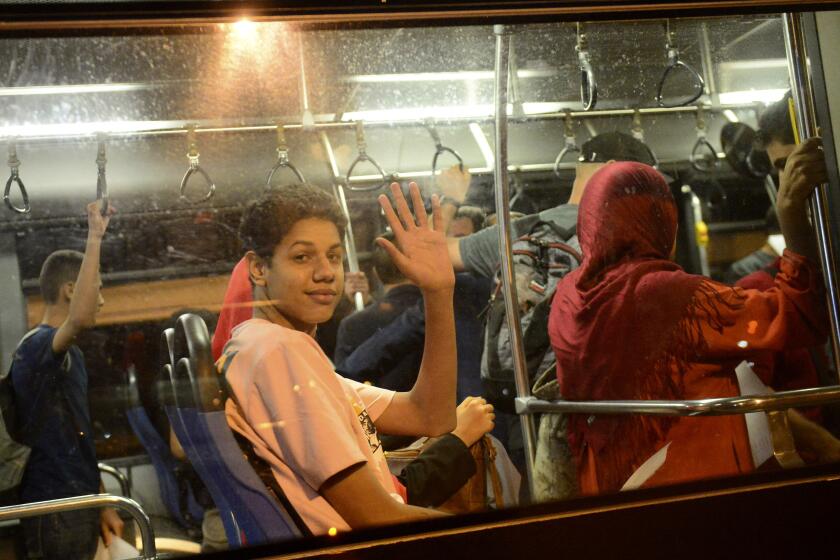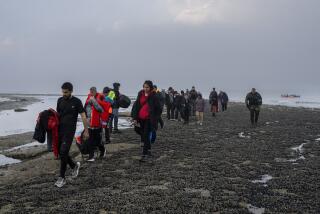They’re desperate to flee violence in Sudan. But their passports are stuck, so they are, too
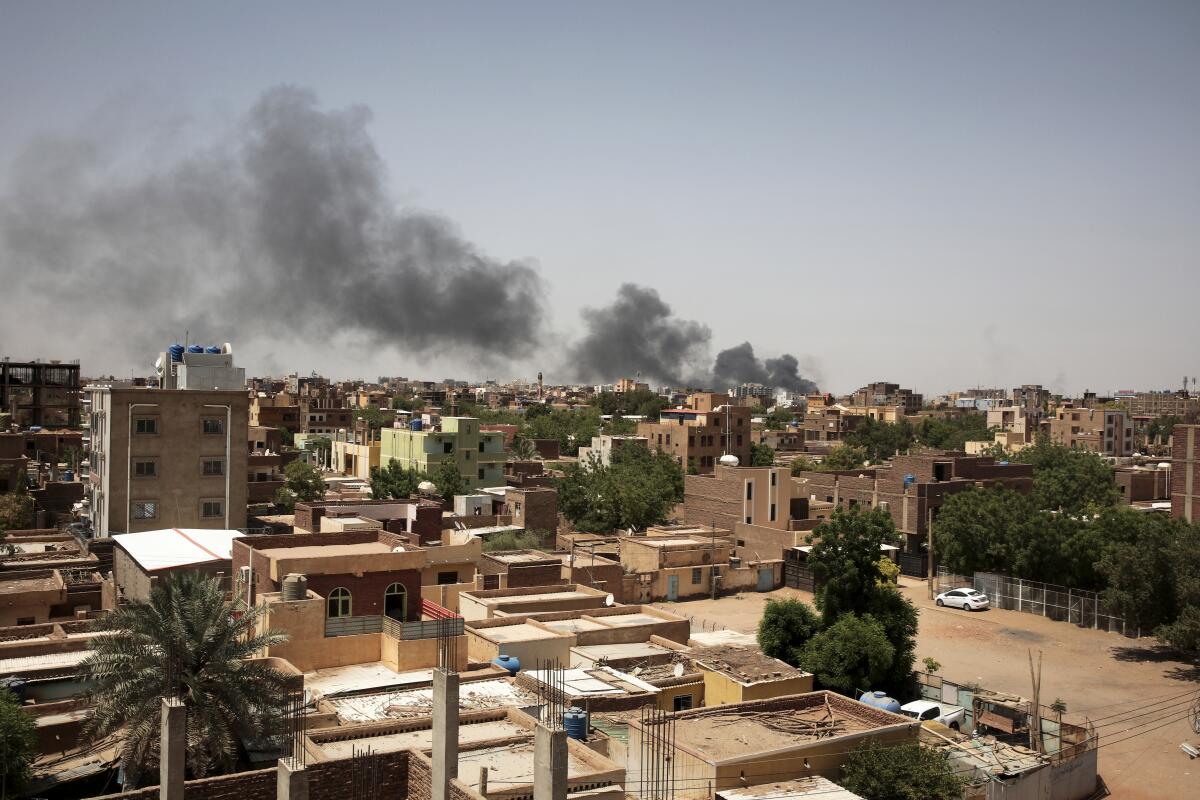
- Share via
BEIRUT — It took a bullet for Ashraf Malik to start panicking. For the first three days of Sudan’s latest eruption of armed conflict, the 23-year-old dental student bunkered in his apartment in Khartoum, watching the fighting rage close to his neighborhood in the Sudanese capital but feeling relatively unconcerned.
“I didn’t take it seriously. I thought it would be a minor conflict and resolve itself within a couple of days, as usual,” he said in an interview via WhatsApp.
But then a .50 caliber slug smashed through a window, chomping out an iPhone-sized chunk in the wall above where his cousin was sleeping.
“That’s when we decided to leave,” he said.
There was just one problem: Malik couldn’t get his passport. Two days before the fighting began, he had handed it over to the Spanish Embassy to obtain a visa to attend a dentistry conference in Madrid. Now, Khartoum’s diplomatic quarter was experiencing some of the hardest fighting in the battle for supremacy between the Sudanese army and the paramilitary Rapid Support Forces. The embassy was closed.
Days later, when it posted an emergency phone contact, he finally managed to reach someone.
The U.S. has invested enormous political capital in peace for Sudan, which would also benefit the fight against terrorism.
“When she knew I wasn’t Spanish, she hung up. I called again, and she said, ‘You’re not Spanish. I can’t help you,’ and hung up again. I called again and told her the embassy has my passport, but she said it didn’t matter and that they couldn’t help me,” Malik said. “Then she blocked my number.”
Almost a month into the fighting, hundreds — potentially thousands — of passport-holding Sudanese like Malik remain stranded because their documents are stuck in embassies whose international staff has long since been evacuated.
They’re unable to flee the country as the fighting rages, despite ongoing negotiations and cease-fires that are broken almost as soon as they are set. Khartoum, a city of roughly 5.4 million people, has seen hundreds of thousands escape as streets become battlegrounds and fighter jets hunt in the skies above. Some 600 people have been killed, and thousands more have been wounded.
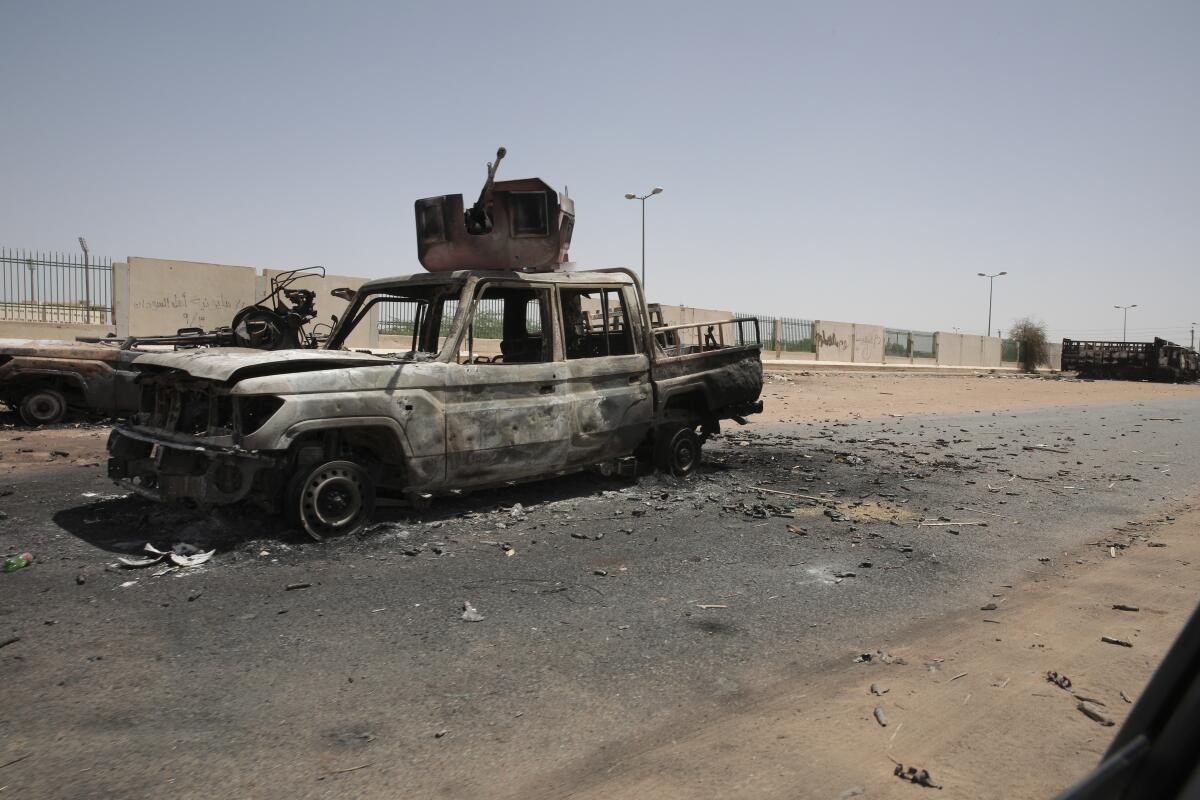
On Tuesday, the United Nations’ senior aid envoy Martin Griffiths said the number of people internally displaced by the violence had topped 700,000.
“It’s a race against time to provide life-saving assistance to those in need. The fighting needs to stop now,” he tweeted.
By April 24, nine days into the fighting, foreign embassies had managed to evacuate thousands of their nationals, including about 1,000 from the European Union. But there had been no action for people like Rasha Omer, 37, an Amsterdam-based social media manager who has permanent residency in the Netherlands but whose mother, Nafisa, and brother, Abdulrahman, were in Khartoum. They had submitted their passports to the Dutch Embassy early last month to get visas to visit her in Amsterdam after Ramadan.
“We tried calling and emailing multiple times but got no response,” Omer said. “I also asked if they could send me a letter detailing what happened in case my family could use this as a supporting document. They never responded.”
While many other countries have scrambled to get their private citizens out of violence-racked Sudan, the U.S. has evacuated only diplomatic staff.
The Twitter account of the Dutch Ministry of Foreign Affairs responded April 25 to a Sudanese journalist asking how to retrieve passports by saying it “deeply regrets the current situation you’re in” but that the embassy was closed and “we advise to apply for a new passport with your local authorities.”
But that was clearly an impossibility with Khartoum virtually a war zone and no passport-printing facilities available outside the capital.
“What local authorities? There is NO WAY that the Dutch ministry of foreign affairs could be so detached from the reality of what’s happening in Sudan that they don’t know that there seems to be NO local authorities in Sudan capable of processing any formal documents,” one Twitter user wrote in reply.
Other Sudanese compared their treatment with the travel facilities offered to Ukrainians when their country plunged into war. Thousands signed a petition asking the British Parliament to set up a mechanism allowing Sudanese affected by the conflict to join their families in the U.K., just as it had for Ukrainians.
Civilians were packing buses and trucks for Sudan’s northern border with Egypt, with many others headed to Port Sudan, on the country’s Red Sea coast.
“The [British] Government should aim to treat all people equally, a war is a war, and people affected by war should be treated and helped equally,” the petition said.
Initially, Reem Abbass, 33, a writer in Khartoum, was sure the fighting would end within a week; she even assured organizers of a workshop in France that she would attend. But as the violence spun on, she found herself in limbo, unable to make any plans with her parents to flee because her passport was at the Spanish Embassy (she had planned a visit to Spain after the workshop).
“My family didn’t know what to do. I was afraid my mom’s medicine would run out, and my father is also sick; I didn’t know what our plan was as a family,” she said.
Though she understood embassies prioritized staff and their nationals, she expected some level of responsibility toward visa applicants.
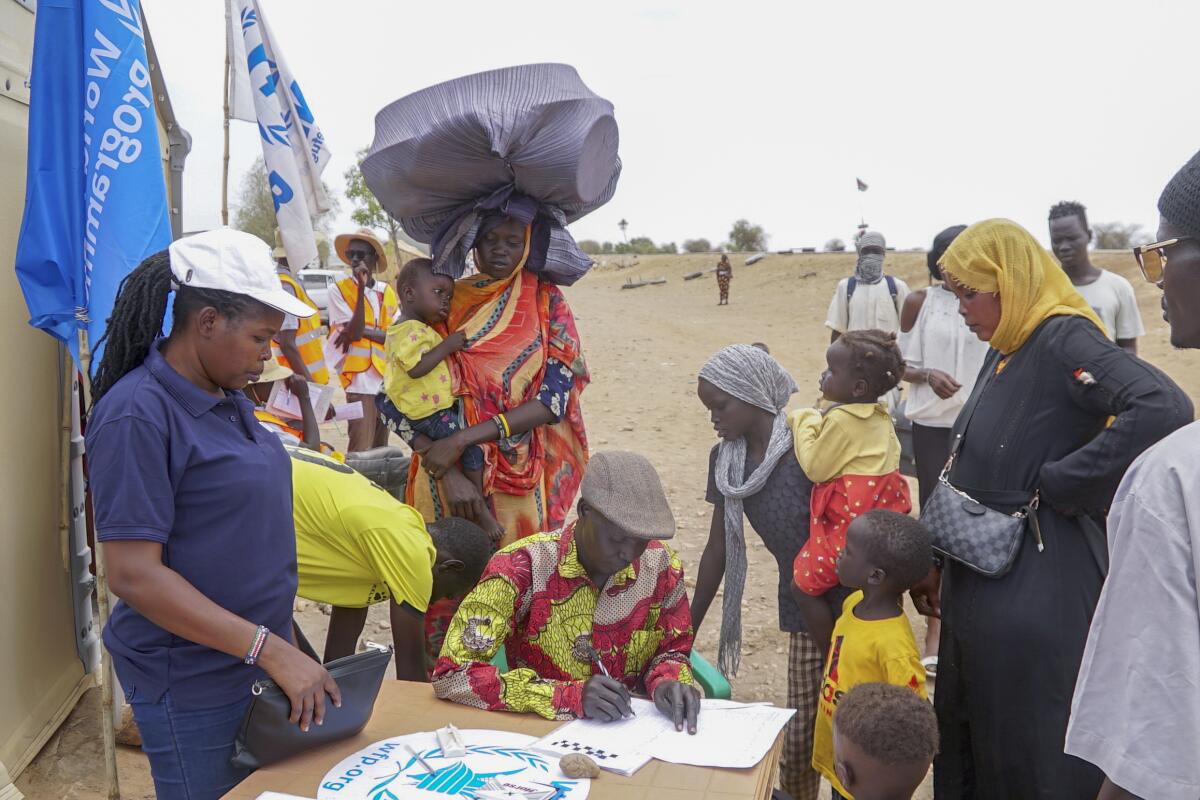
“OK, you’re safe, you’re evacuated. Now please help us,” she said. “These are embassies. They have protection from the authorities. Open it an hour and give us the passports. And then it’s our responsibility.”
Instead, the response has been ad hoc. Some embassies gave people a few hours to pick up passports before shredding them. Others said they would provide a letter certifying that the passport was in the embassy’s possession.
Ahmad Mahmoud, a Sudanese filmmaker, had submitted his passport in late March to the Swedish Embassy to attend a film festival in April in the city of Malmo. After pleading for days via email and WhatsApp to get his passport back, even without a visa, he was told to look for a “Plan B,” and that the embassy would not be able to furnish any kind of supporting documentation. Eventually, the embassy staff member with whom he was communicating stopped responding.
That left Mahmoud enraged.
Start your day right
Sign up for Essential California for the L.A. Times biggest news, features and recommendations in your inbox six days a week.
You may occasionally receive promotional content from the Los Angeles Times.
“There’s no need to leave a passport at the embassy,” he said, citing electronically issued visas. “I know they do this for some nationalities. But some of us are not worthy of keeping our passport with us, it seems.”
Mahmoud finally decided to escape to Port Sudan, a 13-hour drive from Khartoum. He’s staying in a friend’s apartment with his wife, but is still unsure what to do.
“My wife won’t leave the country without me, and it feels like she’s stuck because of me,” he said.
Omer, the social media manager, and her family also gave up on their passports. On April 26, they headed to the Egyptian border, where the Sudanese government had set up a limited consular office. They arrived two days later, and two days after that, Omer’s parents crossed into Egypt.
A surge in tuberculosis, partly fueled by global conflicts, is now killing more people worldwide than COVID-19 or AIDS.
Her brother, Abdulrahman, found an expired passport of his whose validity he extended, but two weeks later, he’s still waiting for permission to cross.
Malik, the student, and his family also wanted to escape to Egypt, but they waited for him to get his passport back from the Spanish Embassy. When the fighting came close to their home, they decided they had to leave right away.
While the others headed for the Egyptian border, Malik and his brother went to Port Sudan. When evacuations began from there, his brother boarded a ship bound for Jeddah, in Saudi Arabia, then went on to Dubai. But Malik remains in Port Sudan.
“I’m still trying to get the passport, but no response,” he said.
“I’m just stuck here. All my family escaped. I’m the only one still here.”
More to Read
Sign up for Essential California
The most important California stories and recommendations in your inbox every morning.
You may occasionally receive promotional content from the Los Angeles Times.
